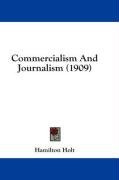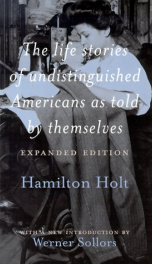Commercialism and Journalism

From Content: "In the United States of America, public opinion prevails. It is an axiom of the old political economy, as well as of the new sociology, that no man, or set of men, may with impunity defy public opinion; no law can be enforced contrary to its behests; and even life itself is scarcely worth living without its approbation. Public opinion is the ultimate force that controls the destiny of our democracy. By common consent we editors are called the "moulders of public opinion." Writing in our easy chairs or making suave speeches over the walnuts and wine, we take scrupulous care to expatiate on this phase of our function. But the real question is: who "moulds" us? for assuredly the hand that moulds the editor moulds the world. I propose to discuss this evening the ultimate power in control of our journals. And this as you will see implies such vital questions as: Are we editors free to say what we believe? Do we believe what we say? Do we fool all the people some of the time, some of the people all the time, or only ourselves? Is advertising or circulation-profits or popularity-our secret solicitude? Or do we follow faithfully the stern daughter of the voice of God? In short, is journalism a profession or a business? There are almost as many answers to these questions as there are people to ask them. There are those of us who jubilantly burst into poetry, singing:- "Here shall the press the people's rights maintain," Unawed by influence and unbribed by gain." On the other hand there are some of us quite ready to corroborate from our own experience the confessions of one New York journalist who wrote:- There is no such thing in America as an independent press. I am paid for keeping honest opinions out of the paper I am connected with. If I should allow honest opinions to be printed in one issue of my paper, before twenty-four hours my occupation, like Othello's, would be gone. The business of a New York journalist is to distort the truth, to lie outright, to pervert, to vilify, to fawn at the foot of Mammon, and to sell his country and his race for his daily bread. We are the tools or vassals of the rich men behind the scenes. Our time, our talents, our lives, our possibilities, are all the property of other men. We are intellectual prostitutes. I come to California, therefore, to tell you with all sincerity and candor the real conditions under which we editors do our work, and the forces that help and hinder us in the discharge of our duties to society and to the journals that we control or that control us." --This text refers to the Kindle Edition edition.
Info about the book
Author:
Series:
Unknown
ASIN:
B003YMO57A
Rating:
3.5/5 (4)Your rating:
0/5
Languge:
English
Users who have this book
Users who want this book
What readers are saying
What do you think? Write your own comment on this book!
write a commentif you like Commercialism and Journalism try:
Other books by this author
Do you want to exchange books? It’s EASY!
Get registered and find other users who want to give their favourite books to good hands!


